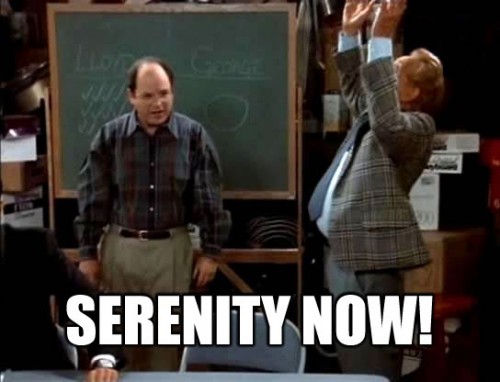
1. Think positive! The New Yorker this week pushes back against the “think I can” trend, famously espoused by Thomas the Train – and even in adult media, too. While it’s certain that confidence often sometimes helps (Seahawks defensiveback Richard Sherman self-imputed the title “best cornerback in the league” and subsequently grew into it), it tends to break down in the long run, ht TB:
According to a great deal of research, positive fantasies may lessen your chances of succeeding. In one experiment, the social psychologists Gabriele Oettingen and Doris Mayer asked eighty-three German students to rate the extent to which they “experienced positive thoughts, images, or fantasies on the subject of transition into work life, graduating from university, looking for and finding a job.” Two years later, they approached the same students and asked about their post-college job experiences. Those who harbored positive fantasies put in fewer job applications, received fewer job offers, and ultimately earned lower salaries. The same was true in other contexts, too. Students who fantasized were less likely to ask their romantic crushes on a date and more likely to struggle academically. Hip-surgery patients also recovered more slowly when they dwelled on positive fantasies of walking without pain.
One thing The New Yorker omits is the Oettingen’s and Mayer’s distinction between expectations of success (beliefs) and fantasies (images). From a theological anthropology perspective, the difference on this point is important. One implication is that things we want to believe rarely cross the line into actual expectation: to extrapolate a bit, self-assurance is rarely convincing; the fantastical element of it can be downright paralyzing. Once again, Rudolf Bultmann’s image of a man trying to pull himself out of a swamp by tugging upward on his own hair seems an apt metaphor. Speaking of religion, now that we’re in fantastical territory, it’s worth mentioning the article’s turn to an unfortunate, though unsurprising, parallel:
Like religion, [positive thinking techniques] offer an appealing, non-technical solution to life’s biggest problems while demanding nothing more of their adherents than faith. (Indeed, “The Secret” features verses from Matthew and Mark, promoting the idea that people receive in life what they seek in prayer.) But while many people give religion a pass because it claims to focus on questions that can’t be answered with science, the same is not true of success. Though Byrne [of “The Secret”] presents her ideas without evidence, we can measure their worth with data.
This is an unnecessary pot-shot. As far as I know, the problem of evil has yet to be solved, apophatic streams are alive and well in many traditions, and Christianity makes the human being more problematic, not less. The parallel between Alfie visualizing a promotion and the idea of dying with a crucified God is a strained one (to take another example, Buddhism’s billion-kalpa hells aren’t rosy, either). But along with the author here, we should refrain from underestimating self-help’s infiltration of movements across the ideological board, whether in sanctification-heavy Christian sects, uncritically ‘humanist’ atheist/agnostic circles, etc. In other words, the human desire to ‘think positive’ and skimp on our thornier emotions runs far broader than “The Secret”; as far as Christianity is concerned, it is a universally human tendency (image from Radio Free Babylon’s “Coffee with Jesus“).
2. Speaking of anthropology, a fantastic article at The New York Times examines alcoholism “Through a Doctor’s Eyes“. It gives a brief history of how alcoholism has been perceived, and it also reviews a promising play, Bill W. and Dr. Bob, ht BJ:
What if heavy drinking — alcoholism — was not a sin or a sign of weakness but a disease? In 1937, scientists established the Research Council on Problems of Alcohol, which studied alcohol metabolism and drinking behaviors while trying to avoid moral judgments.
But the most notable development in the 1930s was the founding of A.A. As depicted in the play, A.A. resulted from the chance meeting of Bill Wilson, a New York stockbroker, and Dr. Bob Smith, an Akron surgeon in 1935. Both drank heavily and were destroying their marriages and lives. “You want to drink more than you want to live!” Bob’s wife, Anne, screams at him at one point…
Of course, calling something a disease did not automatically eliminate the entrenched cultural beliefs about the condition. As with patients who developed lung cancer from smoking or diabetes from being overweight, alcoholics were still often viewed as lazy and merely lacking the willpower to stop an unhealthy habit. On rounds at my hospital, chronic alcoholics who promise future sobriety are generally met with eye-rolling and, at times, derision…
Perhaps the greatest virtue of “Bill W. and Dr. Bob” is how it humanizes alcoholics. Both main characters display a wide range of behaviors, ranging from empowered to helpless to angry to remorseful. It is hard not to sympathize with them. Anne and Bill’s wife, Lois, realize that they, too, belong to a community of sufferers. They founded Al-Anon in 1951 to assist the spouses and families of alcoholics.
At the risk of sounding moralistic, “sin” and “disease” are far from mutually exclusive, but their division perhaps works from a common misunderstanding that ‘normal’ people have a high degree of free agency. From our perspective, alcoholism shouldn’t be totally separated from more mundane compulsions, over which we always have less free choice than we’d like to think. As our own John Z. insightfully points out,
[A]ddiction echoes the biblical portrait of original sin, where man is in conflict with God and unable to surrender his prerogatives.
To be clear, as far as the Twelve Steps are concerned, alcoholics are not free to choose sobriety. Bishop FitzSimons Allison once said, “The amazing thing about the alcoholic is that he can choose between gin and beer and whiskey, but he can’t choose not to drink.” This is the same view of humanity that we see played out in the Garden of Eden – that man is free to choose everything except the one thing he should be choosing: God, over and above himself. In traditional Protestant (or “Reformational”) Christian doctrine, this idea is called the bound will. While the unfree human will finds painfully clear expression in alcoholism, Christianity would claim that the problem is universal.
3. Well, to continue our eat-your-veggies section on low anthropology, Time magazine interrupts the flow of so-cute-you’ll-cry posts in its Animals section to report, “Depressed Man Tries to Feed Himself to Tigers, Gets Rejected“, ht SMB:
Yang, who according to his brother suffers from mental health issues, climbed a tree to breach the enclosure. Stunned visitors witnessed how he made “exaggerated movements” for 20 minutes to tempt the Bengal tigers, but while scratching him and dragging him by the back of his neck, the beasts refused to devour him.
Zoo keepers finally tranquilized the tigers in order to rescue Yang, who is now being treated for depression.
4. For those of us who are Whit Stillman fanatics, the Mockingbird-favorite director has quite queue on his hands. First up, at the end of January he announced a novel adapting Jane Austen’s unfinished Lady Susan, less-than-economically entitled Love & Friendship: An Adaptation of Jane Austen’s Unfinished Novella Concerning the Beautiful Lady Susan Vernon, Her Loves and Friendships, and the Strange Antagonism of the DeCourcy Family. The project will also have a big-screen counterpart, featuring Sienna Miller and Disco veteran Chloe Sevigny. And finally, in a highly promising television debut, Stillman will write and direct a show for Amazon Studios featuring young expats in Paris. Of course, if all that’s overwhelming, we should have plenty of criticism up on the blog – which gives you both the movies/novels/shows and someone’s opinion on it.
5. The Jesuit Post produced (in my opinion) the best religion article of the past two weeks, interviewing poet and memoirist Mary Karr and commenting on her life and work, especially its manifestation of the truth that suffering often turns out to be the touchstone for God’s grace, ht BJ:
Still, writing honest memoirs demanded that she relive “devastating” memories. “I had to occupy that mind—that helplessness and dependence of a kid—in order to feel what was actually going on at that time.”
Paradoxically, in these places of great vulnerability, hurt and abandonment, we are closest to God—and vice versa. In such moments, as they are lived and as we relive them in memory, we find God in our stories. “It’s only in heartbreak that we turn to God,” she tells me. Elsewhere, she has written, “People usually (always?) come to church…as to prayer and poetry—through suffering and terror, need and fear—flaming arrows gone thump in the heart.” This idea, which runs through her work, reappears even more starkly in a poem from Sinners Welcome (2006): “Only in tears do I speak/ directly to him and with such/ conviction.”…
It was in moments of tears—especially when trying to get sober—that God found her. “Some of my Protestant friends claim to turn out of virtue. I don’t have enough virtue to turn.”
Karr’s gritty—even coarse—stories of sin and salvation have an undeniable authenticity. She shows us that grace is not always graceful. But if God is to be found in all things, then it is precisely in these all-too-human tales that God is at work.
6. This week brought a bevvy of great social science articles, starting with The Telegraph‘s “Want your child to be a success? Quit scheduling and let them play freely“. Though the title says it all, some highlights are below, ht MC:
The Tiger Parent society we live in often means parents feel a pressure to constantly keep their children occupied, but it’s important that time is found in the week to give children free reign to play and choose the play they’re interested in. You can’t hothouse children and force them to have certain interests. Trying to do so could be counter-productive…
A report written for the UK National Trust cites evidence that the area where children are allowed to range unsupervised around their homes has shrunk by 90 per cent since the Seventies. At the same time, in Britain and many other countries, rates of obesity, self-harm and mental health disorders diagnosed in children have climbed significantly. This is attributed to a now well recognised phenomena of nature deficit disorder, arising from children having very limited access to the outdoors and natural environments.
A number of research studies have also shown that the main characteristic of family life which is damaging to educational success and emotional well-being is stress. Parents get stressed through poverty and related difficulties, of course, but also through feeling that their children’s every waking moment has to be organised and with a clear, educational purpose. What is much more important, however, is to have fun with your children. Contrary to some popular beliefs, some quite serious scientific research has shown that being in a family that has fun is a better predictor of school outcomes than early reading abilities…
Organizing everything perfectly so that our children have exactly the right experiences is generally far from “fun”. Something like spontaneity is at risk, as it always is with parenting rules of techniques which, because of their very universality, are often depersonalized – a sport, an instrument and an extracurricular isn’t freedom nor, generally, fun. But neither is “independent play” or x amount of outdoors time a categorically useful imperative. In any of these cases, the law increasing the trespass certainly isn’t the worst lens for viewing parenting – but easier said than done; unfortunately, there’s little many of us can do about the pressures and expectations for parenting – it’s practically the air we breathe. No wonder bad-parenting ‘confessionals’ are on the rise; that emergent blog-genre, like this Telegraph article, do everyone the considerable service of loosening those expectations, if only a bit.
7. Loneliness is killing us, reported The Guardian on Monday, ht RW:
Loneliness has dramatic consequences on health. Feeling isolated from others can disrupt sleep, raise blood pressure, lower immunity, increase depression, lower overall subjective wellbeing and increase the stress hormone cortisol (at sustained high levels, cortisol gradually wears your body down).
Older people can avoid the consequences of loneliness by staying in touch with former colleagues, taking part in family gatherings and sharing good times with family and friends, says Cacioppo. Moving away from an established community to retire to a seaside idyll could often be a mistake, but such good common sense probably doesn’t go far enough.
The Lonely Society, a 2010 report commissioned by The Mental Health Foundation, cited a link between our “individualistic society” and the increase in common mental health disorders in the last 50 years.
“Individualistic society” is phrase that deserves unpacking. People often see in these words a only economic inequality or the decline of social bodies like churches. Both these are of course factors, but in decrying “Individualism”, some vague specter like the “Modernism” of Pius IX, we sometimes forget its deeper roots in our focus on self-actualization, a humanist religion we have, to some extent, chosen (and continually choose), which bears loneliness as its cost. Not to be too grim, but that’s perhaps one reason why the elderly – who have been put well past the youngs’ visions of the perfect, actualized, successful self – seem to suffer the effects of loneliness disproportionately.
8. The Atlantic reports a fascinating use of Facebook data (above) to measure the effects of breakups on social activity, ht WB:
Just like how Google thinks it can predict flu outbreaks, Facebook’s stockpiles of activity logs are becoming a serious player in the epidemiology of behavioral pathology…
The Facebook team reviewed data from “people who were on the receiving end of a separation” and looked at how their Facebook activity changed before and after said separation. They define being on the receiving end of a separation as “people who had been in a relationship for at least four weeks with someone who then switched their relationship status to ‘Single.'”…
“This points towards people receiving support their friends in times where they need it,” they conclude, “whether it comes in the form of private messages, timeline posts or comments.”
Or it points towards people withdrawing into an unnaturally curated social network for low-risk validation as a replacement for real human connection. However you want to say it. People can be unpredictable, irrational, and unavailable. A social network will never break up with you.
Cue Joaquin Phoenix, and wow, dark week on the Net. See too a Frontline on “Generation Like“, which was honestly too long to watch, but we’ve heard good things, ht ER.
9. An in-depth interview with Lebron James at GQ has some seriously good nuggets; the “secularization thesis” gets a quirky piece of support with the discovery that Meryl Streep receives more explicit gratitude in Oscar speeches than God, who maintains a strong second over Oprah Winfrey and Sidney Poitier, and finally, Kurt Vonnegut, ht BJ; in gender Law, Jezebel reports an epidemic of inferiority complexes, specifically inferiority to actor Idris Elba who, male Twitter users pointed out, doesn’t “help you find your head scarf before you go to bed” or “show up to the club with a charger when your phone died” or, for that matter, “help you mix the olive, coconut and castor oil with honey to help you make your hair luxurious”… “I do” (ht CM). Finally, Kurt Vonnegut’s rejected Master’s Thesis yields this infographic, released by Visual.ly, on the shapes of stories, ht BJ:

COMMENTS
2 responses to “Another Week Ends: Negatively Positive Thinking, Bill W. and Dr. Bob, Love and Friendship, Fun Families, Facebook Sociology and Vonnegut’s Shapes of Stories”
Leave a Reply



















ok, I’ll take the Bultmann bait! Where’d that swamp illustration come from?
I can’t remember, to be honest – but from an essay in either “Faith and Understanding”, ed Robert Funk; or Essays, Philosophical and Theological. The illustration stuck with me though.